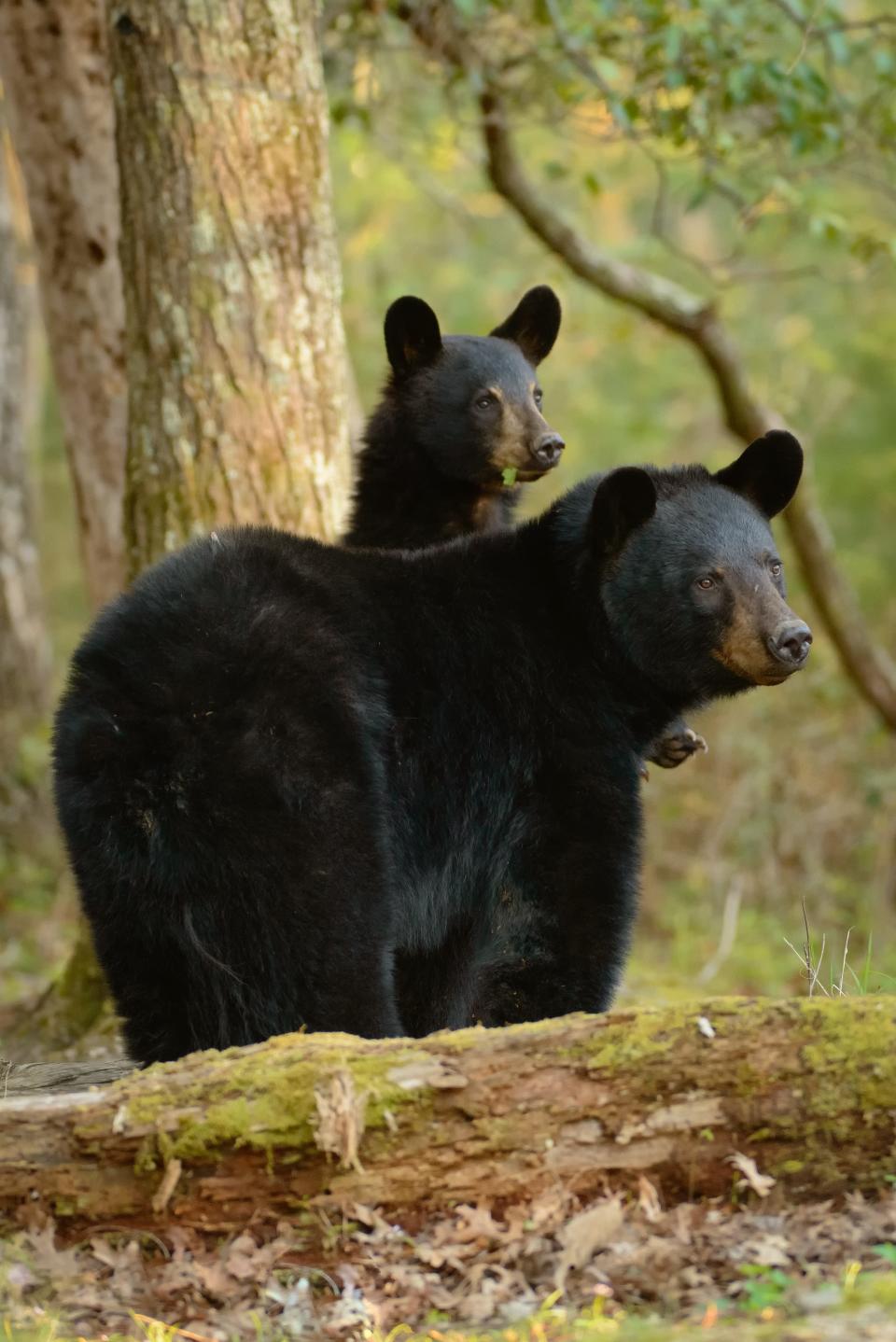What to do if you see a bear in the Smokies or your backyard. (Hint: Don't run)
As the weather gets warmer, more American black bears will be coming out to play. Though a surprise bear sighting in Great Smoky Mountains National Park – or even in your backyard – might be exciting, now is a good time for a reminder on how to stay safe around these furry but wild creatures.
"Black bears are normally very elusive and shy animals … and unless they have become accustomed to human food sources, they tend to avoid people,” the Tennessee Wildlife Resources Agency website states.
Even so, there have been a handful of bear attacks in recent years. A bear broke into a cabin and injured a man vacationing in Gatlinburg last year; a 16-year-old girl was attacked while sleeping in a hammock in Great Smoky Mountains National Park in 2021; a camper found dead in the Hazel Creek area in 2020 was most likely killed by a bear.
TWRA and the national park advise people to leave black bears be and to stay safe distances away from them. It’s even illegal to willfully approach within 50 yards of a bear in the national park.
Here’s what you need to know about bear safety (so you won’t become the inspiration for a “Cocaine Bear” sequel).
When are bear sightings likely in Tennessee?
Black bears in Tennessee typically begin to emerge from their winter dens around late March and early April, TWRA reports.
Sightings in the Smokies and even in residential areas are possible as the bears search for food.
Sightings and reports to TWRA peak in June and July as breeding season begins and newly independent cubs start roaming.
Bears are most active during early morning and late evening hours.
Nearly 2,000 bears live in the Great Smoky Mountains National Park, and they inhabit all elevations. The national park is one of the largest protected areas in the eastern United States where wild black bears live in natural surroundings.
What to do if you see a bear in Great Smoky Mountains National Park
Bears are usually tolerant of humans, TWRA states. But they are wild animals, and their behavior can be dangerous and unpredictable.
Do not feed or approach a bear, and do not let it approach you, national park experts advise. Remain watchful.
If it notices you but continues its natural behavior, no action is needed. Just keep observing.
If it does change its behavior, you are too close. Slowly back away without turning your back. Do not run.
Being too close can cause the bear to show aggressive behavior: making loud noises, swatting the ground, running toward you. The bear is demanding more space.
If you slowly increase the distance between you and the bear, it will likely do the same.

What to do if you see a bear in your neighborhood
Bears might wander into residential neighborhoods while searching for food. Garbage, pet food and birdfeeders are common lures.
Never approach or feed bears, TWRA and Great Smoky Mountains National Park advise.
Immediately report any bear sightings in towns, cities and neighborhoods to the TWRA or local police.
Bears will almost always look for and find an escape route if they are left alone, TWRA’s site states.
Never surround a tree a bear has climbed into, especially a female with cubs.
For safety, do not form a crowd if a bear enters an area with human populations. A cornered bear’s behavior can be unpredictable.
Locate and remove the lure that caused the bear to come into your area.
How to reduce the risk of bears in neighborhoods
Do not store food, garbage, or other recyclables in areas accessible to bears, TWRA advises.
Keep grills and smokers clean and stored in a secure area when not in use.
Feed outdoor pets a portion size they will completely consume during each meal. Securely store pet food.
Do not feed birds or other wildlife where bears are active.
Talk to family and neighbors when bear activity is occurring in your area.
What to do if a bear follows you or becomes aggressive
If a bear follows you, change your direction. If it continues, stand your ground. Act aggressively to intimidate it, Great Smoky Mountains National Park’s site states.
Raise your arms to appear larger. Yell and throw non-food objects such as rocks or sticks until it leaves the area. Use bear spray when it comes within 20 yards of you.
Form a group if you’re with other people to make yourselves look as large as possible.
Never run from a bear.
What to do if a black bear attacks
“Fight back aggressively and do not play dead! Use pepper spray, sticks, rocks, or anything you can find to defend yourself,” TWRA advises.
Immediately notify the TWRA if you witness aggressive behavior by black bears. The number for TWRA’s East Region office is 800-831-1174.
Devarrick Turner is a trending news reporter. Email devarrick.turner@knoxnews.com. Twitter @dturner1208.
Support strong local journalism by subscribing at knoxnews.com/subscribe.
This article originally appeared on Knoxville News Sentinel: Bears in Great Smoky Mountains: What to do if you see one

